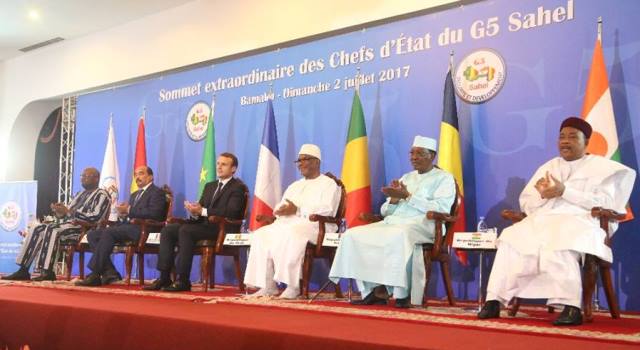If the extraordinary summit of the G5 Sahel Heads of State, held in Bamako on 2 July, allowed to launch the regional anti-terrorist force, there remains the thorny question of the means which are lacking. And that we have to look for.
The Sahel is today the most shared concern. From Bamako to N’Djamena, Paris via New York where the Security Council endorsed on June 21, the deployment of the G5 Sahel force to fight terrorism and trafficking in this region which has become a security threat. On Sunday July 2, the extraordinary summit in Bamako brought together the Heads of State of the G5 Sahel and French President Emmanuel Macron as guest of honor.
The objective of the Bamako summit was to concretize the idea, born in 2015 in N’Djamena, of the creation of an anti-terrorist force in the Sahel to fight against terrorism and trafficking. On 21 June, the Security Council welcomed the initiative but gave no mandate to the force, which further complicated the issue of funding that was at the heart of the summit.
Where will the means come from ?
During a press conference with his French counterpart, Emmanuel Macron, the Malian president, Ibrahim Boubacar Keïta, moreover current president of the G5 Sahel, said that this force should cost 423 million euros. In early June, at the meeting of G5 Sahel ministers in Bamako, the European Union had decided to support the force to the tune of 50 million euros, or 10% of the budget according to some estimates.
At the extraordinary summit in Bamako, the five G5 countries pledged to contribute 10 million euros each. What is already enough to begin the financing of the force, according to President Keïta, because “those who are facing [the terrorists, ed. note] do not wait”. There is therefore urgency and the G5 countries want to move quickly, and even very quickly.
“There is no need to get all the funding together to start”, said Emmanuel Macron, whose wish is to see the command set up at the end of next month. France will also provide material and logistical assistance (which will cost 8 million euros and will supply 70 tactical vehicles and transmission and protection equipment).
Due to uncertainty about funding, the Security Council urged the G5 Sahel countries to organize a donors’ conference, expected soon, according to the French president. Paris counts on a financial contribution from Germany and other European countries as well as the support of the United States present in the region through a military base in Niger. Something to reassure Idriss Deby Itno, the Chadian president, who had expressed in the French press last week his concerns about funding. But, Macron warns, “Results must be there to convince our partners”.
For development in the Sahel, Paris promised an increase in development aid to the tune of € 200 million over five years through AFD (French Development Agency). A director “competent on the Sahel” will be summoned at the head of this structure and will be based in Ouagadougou.
What are the missions of the force ?
In central Mali, jihadist cancer is metastasizing and spreading to neighboring Burkina Faso and Niger. The 5,000-strong G5 Sahel force will be deployed first in this Liptako-Gourma border area (Mali, Niger, Burkina Faso), facing the emergence of violent extremist groups: Katiba Macina of Hamadoun Sangaré alias Kouffa (Mali), Ansarul Islam of Ibrahim Malam Dicko (Burkina Faso) and the Islamic State Group in the Great Sahara of Adnan Abu Walid Al-Saraoui (Niger). This border region is considered by many observers as the epicenter of the crisis in the Sahel.
Last May, during a visit to Bamako after six weeks since taking office, UN under Secretary General of peacekeeping operations, Jean-Pierre Lacroix welcomed the force, which he described as “an encouraging progress” indicating “the willingness of countries to take on the challenges of the Sahel”. It should also be recalled that this force comes in addition to those of Barkhane, which tracks terrorism in the Sahel, and those of the UN (Minusma). Is there a risk of overlap? “No”, replied Jean-Pierre Lacroix, indicating that it will be enough to organize the articulation between the forces, “the differences in the mandates and in the responsibilities” being “very clear”. A position defended by Mr. Macron, who didn’t fail to reiterate France’s commitment to stay in the Sahel to fight terrorism.
But the question of the means, which it was thought would be settled at the summit of Bamako, remains posed. As none of the five countries have the capacity to bear the financial cost of this force, which is confronted with other problems linked to the training of the troops and the equipment, even if France is committed to make efforts at this level.
Boubacar Sangaré

